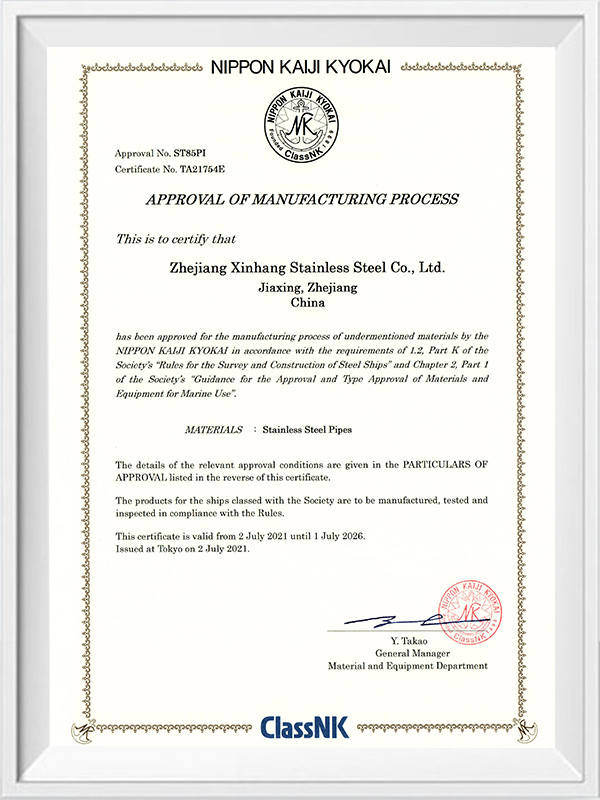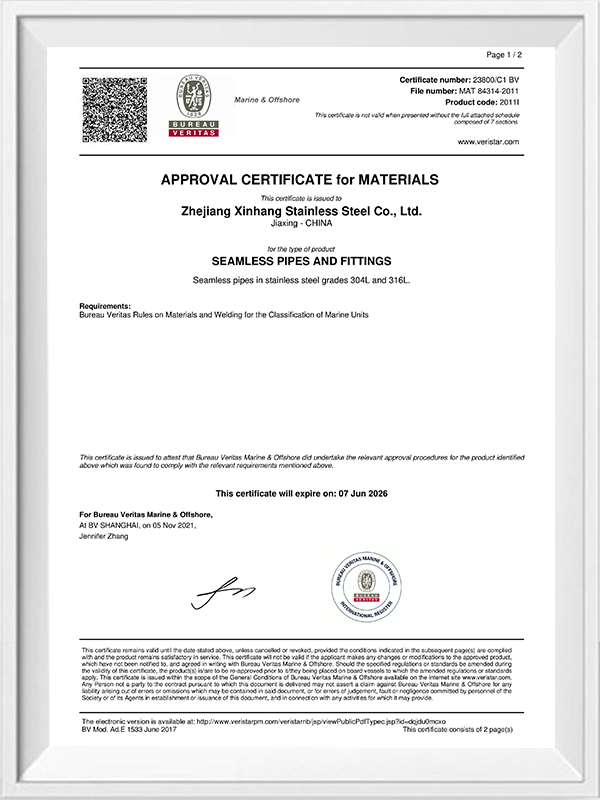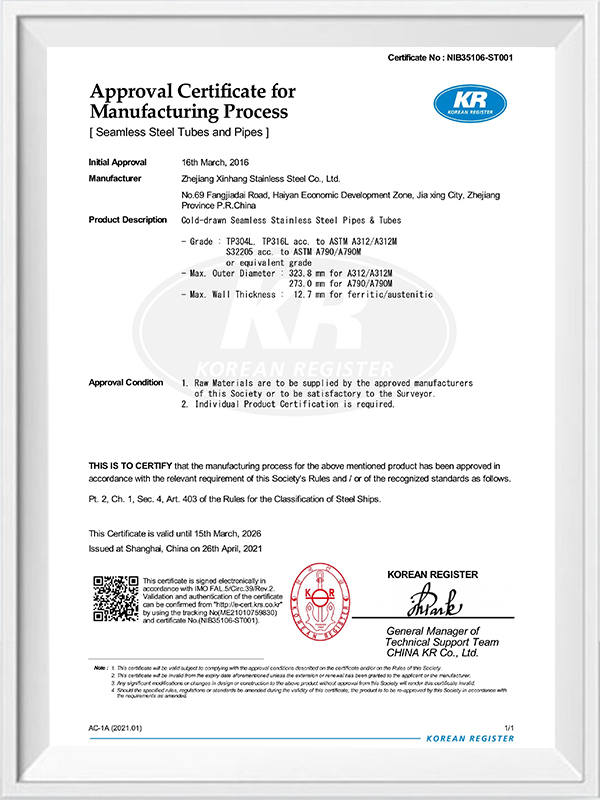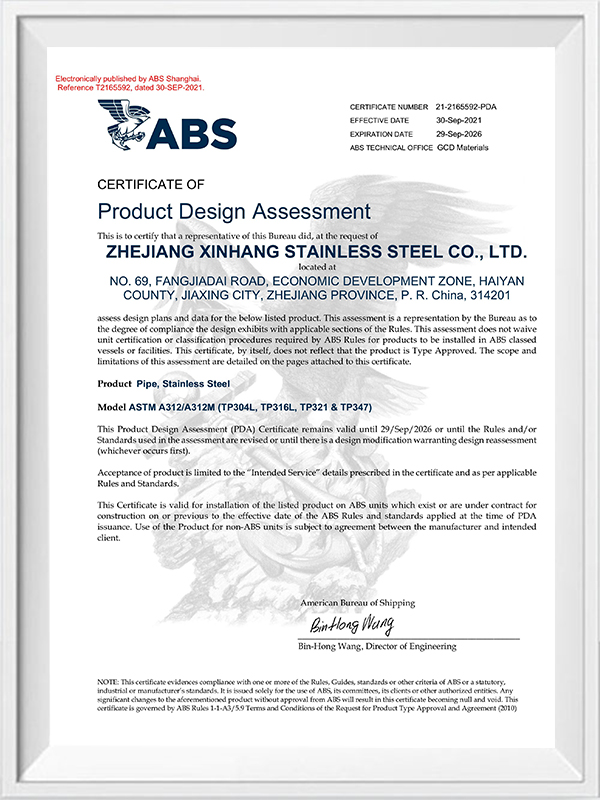

Xinhang Special Material Co., Ltd. Hangzhou Branch is China Stainless Steel Heat Exchanger Tube Manufacturers and Stainless Steel Heat Exchanger Tube Factory, founded in 2007 and moved to Longyou Economic Development Zone, Zhejiang Province, in 2022. It covers an area of 130,000 square meters, more than 30 production lines, 300 workers, 20 R&D people, 30 inspection people and an annual output of 50,000 tons.
It has passed ISO9001:2008 quality management system, PED 97/23/EC EU Pressure Equipment Directive certification, China Special Equipment Manufacturing License (Pressure Tube) TS certification, ASME certification, provincial enterprise standardization management system, ISO14000:2004 environment management system, cleaner production (green enterprise), and a series of certifications, as well as China Classification Society (CCS), American Bureau of Shipping (ABS), British Register of Shipping (LR), Deutsche Veritas (GL), Bureau Veritas Society (BV), Det Norske Veritas (DNV), and Korean Register of Shipping (KR) factory certification.
The main products include stainless steel pipes, pipe fittings, flanges, valves, etc., which are widely used in petroleum, chemical industry, nuclear industry, smelting, shipbuilding, pharmaceuticals, food, water conservancy, electric power, new energy, mechanical equipment, and other fields. The company adheres to the corporate tenet of "quality for survival, reputation for development" and wholeheartedly serves every customer to create a win-win situation.




Best flaring tool choice for stainless steel tubing Use a high-leverage 37° (AN/JIC) or 45° (SAE) precision flaring too...
View MoreBottom line: how to weld stainless steel pipe without sugar and leaks For most stainless steel pipe work, the most reli...
View MoreDirect answer: what a “stainless steel pipe pressure rating” really means A stainless steel pipe does not have one univ...
View MoreIn our shop, bending stainless steel pipe is one of those operations that looks simple but punishes shortcuts. Stainless...
View MoreHow are stainless steel heat exchanger tubes constructed?
Selection of Stainless Steel Grade: The construction begins with selecting the appropriate grade of stainless steel based on factors such as the operating temperature, pressure, corrosive environment, and specific application requirements.
Tube Forming: The stainless steel tubes can be formed using different methods such as hot rolling, cold rolling, or extrusion. These methods shape the stainless steel into the desired tube dimensions, including diameter, thickness, and length.
Welding or Seamless: Stainless steel heat exchanger tubes can be manufactured either through welding or seamless processes. Welded tubes are formed by welding together stainless steel strips or plates to create the tube shape, while seamless tubes are produced from solid billets of stainless steel through a process that does not involve welding.
Heat Treatment: After forming, the tubes may undergo heat treatment processes such as annealing or solution annealing to improve their mechanical properties, eliminate stresses, and enhance corrosion resistance.
Surface Finish: The surface of the stainless steel tubes may undergo various finishing treatments, including pickling, passivation, or polishing, to remove surface contaminants, scale, or oxides and to improve corrosion resistance and aesthetics.
Quality Control: Throughout the construction process, quality control measures are implemented to ensure that the stainless steel heat exchanger tubes meet the specified standards and requirements. This includes dimensional inspection, non-destructive testing (such as ultrasonic testing or radiographic testing) to detect defects, and material analysis to verify the chemical composition and mechanical properties of the tubes.
Packaging and Delivery: Once the tubes pass the quality control checks, they are packaged according to the customer's specifications and delivered to the intended destination for installation in heat exchanger systems.
How do stainless steel heat exchanger tubes perform in high-temperature environments?
Stainless steel heat exchanger tubes are known for their excellent performance in high-temperature environments due to the inherent properties of stainless steel alloys. Here's how they perform:
High Temperature Resistance: Stainless steel alloys are designed to withstand high temperatures without deforming or losing their mechanical properties. They have high melting points and retain their strength even at elevated temperatures, making them suitable for use in high-temperature applications.
Oxidation Resistance: Stainless steel heat exchanger tubes form a passive oxide layer on their surface, which provides protection against oxidation and corrosion at high temperatures. This oxide layer acts as a barrier, preventing further oxidation and maintaining the integrity of the tube even in aggressive environments.
Creep Resistance: Stainless steel alloys exhibit good creep resistance, which is the ability to resist deformation under prolonged exposure to high temperatures and mechanical stress. This property is crucial in applications where the tubes are subjected to high temperatures for extended periods, such as in power generation plants or industrial processes.
Thermal Conductivity: Stainless steel heat exchanger tubes have relatively high thermal conductivity, allowing for efficient heat transfer even at high temperatures. This property helps optimize the performance of heat exchanger systems by facilitating the transfer of heat between the hot and cold fluids.
Corrosion Resistance: In addition to their high-temperature resistance, stainless steel heat exchanger tubes also offer excellent corrosion resistance, which is essential in high-temperature environments where corrosive gases, liquids, or steam may be present. The corrosion-resistant properties of stainless steel help maintain the integrity and longevity of the tubes in such harsh conditions.
Stability and Reliability: Stainless steel heat exchanger tubes are known for their stability and reliability in high-temperature environments. They are less susceptible to thermal expansion and contraction compared to other materials, reducing the risk of leaks or mechanical failure under thermal cycling conditions.
We'll never share your email address and you
can opt out at any time, we promise.